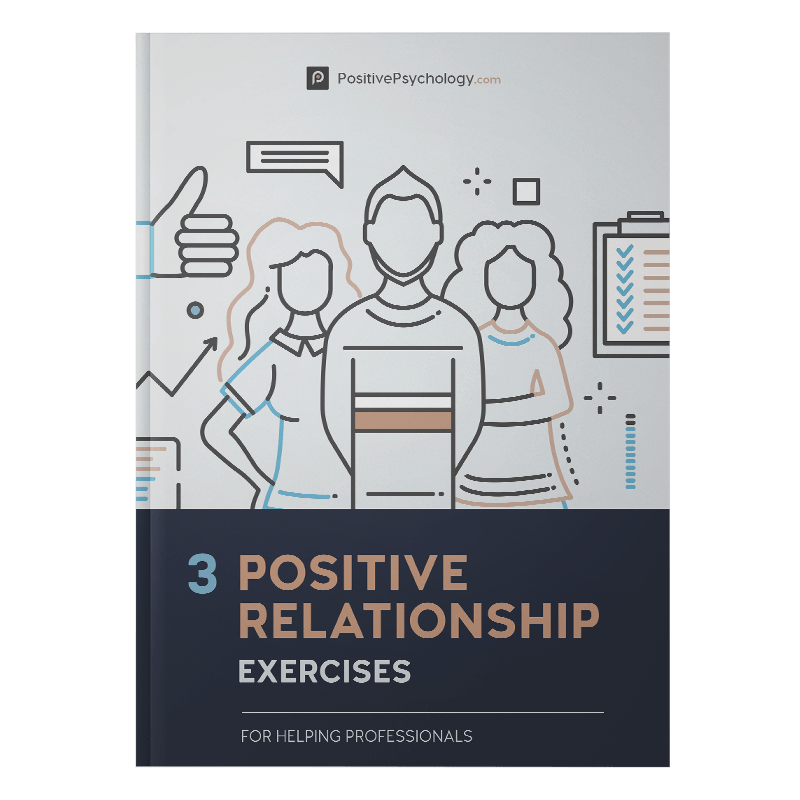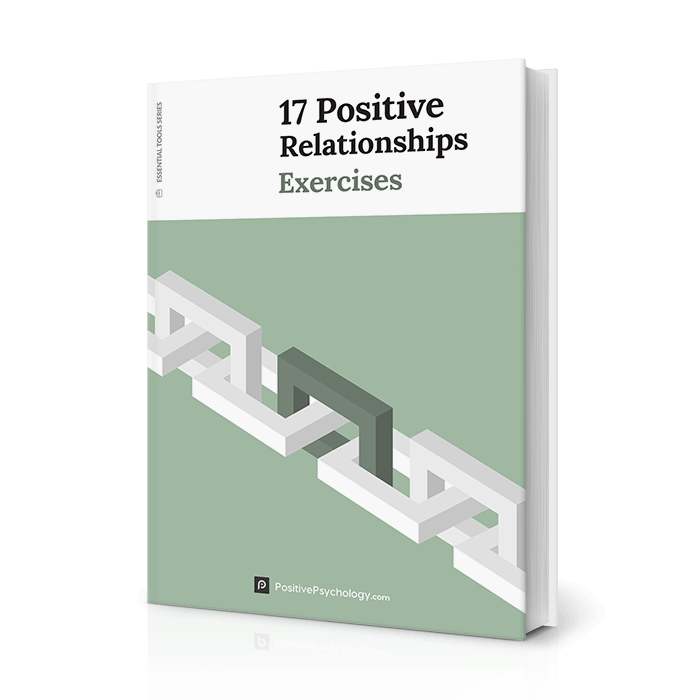

Perhaps you feel shy, awkward, or anxious around other people.
All of us, at times, experience similar feelings and find making conversation difficult while we struggle to leave a good impression (MacLeod, 2018).
Social problems can be helped. Shyness and anxiety can be identified and managed, and conversation skills can be practiced and improved.
This article provides a wealth of worksheets for building and developing social skills in children, students, and adults. You can practice them individually, in counseling, and in group sessions to become socially skilled.
Before you continue, we thought you might like to download our three Positive Relationships Exercises for free. These detailed, science-based exercises will help you or your clients build healthy, life-enriching relationships.
“After you accept that you’re still going to encounter some social unease from time to time, your aim should be to become socially functional” (MacLeod, 2018, p. 48).
The following are a few worksheets that cover a wide range of social skills and considerations and, when practiced, help increase self-knowledge and social awareness.
Friends are a crucial part of your social network. While they can provide valuable support mechanisms for you, you must equally be there for them when they need your help (Wendler, 2020).
The How to Support Your Friends worksheet examines a situation when a friend needed your support.
When providing support, it is essential that you (Wendler, 2020):
Healthy Relationships involve both giving and receiving, and an awareness and consideration of everyone’s needs.
Social skills involve a great deal of nonverbal communication, such as how we stand, how loud we speak, and even the way we tilt our heads. Such cues can provide physical indicators of empathy and help show whether we are currently high or low in energy (Wendler, 2020).
One vital way to improve our social skills is to match our energy with our partner’s or the group we find ourselves in. For example, if we enter a meeting and everyone is excited about a new product launch, low energy may mean we fail to appear part of the team.
The High- and Low-Energy Social Skills worksheet helps us consider the energy exhibited by ourselves and others and whether we match those around us.
Think of a time when a friend, colleague, partner, or group was high in energy. How did you respond? High energy or low energy?
If you matched their energy, it showed empathy and most likely helped you mix and improve your social skills.
Note that there will be times when your circumstances or events prevent you from energy matching, and it is important to practice self-care.

Developing social skills and learning how to interact with the environment effectively are crucial for living a fulfilling and happy life (Matson, 2018).
The following worksheets are helpful exercises for children learning to be more socially adept and communicate successfully.
Becoming more self-aware involves recognizing feelings, thoughts, and their impact on behavior (Fleming, 2021). Developing self-awareness can help children in social settings interact and be sure their needs are not overlooked.
The Self-Awareness for Children worksheet practices self-awareness and self-knowledge by asking the child (or group of children) a series of questions regarding how they are feeling and what they are thinking.
Becoming more self-aware can increase the child’s empathy and understanding of their own and others’ hopes, wishes, and needs.
Making a decision can be stressful, and not making one can be worse. Our choices often have social implications, building or damaging relationships, so they need to be taken carefully (Peters, 2018).
The Responsible Decision-Making for Children worksheet prompts the child to reflect on the likely social implications of their choices and how to show respect to themselves and others.
The important decisions we make can have far-reaching impacts. We should give ourselves time to gather information, consider the options and their impact, and seek the help needed.
When children have friends making bad choices that are potentially detrimental to themselves and the social groups around them, it can be all too easy to follow suit (Daniels & Rabar, 2019).
The Good Choices – Bad Choices worksheet can help children reflect on their friends’ poor decisions and how to react to the social pressure and the situation.
We all make mistakes, especially in social situations. It is essential to reflect and learn from what we do and, in the future, behave in ways more in line with our values.

These detailed, science-based exercises will equip you or your clients to build healthy, life-enriching relationships.
Download PDF
By filling out your name and email address below.
Activities where children visualize, role-play, or work through social interactions and engagements can develop their understanding, awareness, self-confidence, and self-knowledge.
And “like any other skill, practice makes perfect” (Daniels & Rabar, 2019, p. 13).
The following activities can be adjusted according to the child’s age and should include appropriate support and supervision (modified from Daniels & Rabar, 2019):
Once finished, tell them that, as with walking blindfolded, you may find you bump into things, sometimes feel lost, and need a little help as you develop your social skills.
Ask the child to say what they saw and heard that helped them make up the story.
Sit with the child and write down a list of questions that could be helpful when starting conversations in various situations, for example:
Do you have any pets? What are their names?
How was your weekend? What did you do?
Then practice the questions and conversation building in pairs.
Practice making up situations, questions, and answers in pairs.
What are you up to over the weekend?
I am going swimming. What about you?
It’s a simple trick and can lead to the next point for discussion.

School can be a great place to make friends and learn valuable social skills.
But it takes practice, and mistakes are inevitable.
The following two worksheets consider what friendship means to the individual and help clarify their self-concept.
Use the What Does Friendship Mean to Me? worksheet to reflect on why friendship is so important to the individual. While increasing feelings of relatedness and closeness, understanding friendship can also help clarify social interactions and keep individual needs in mind.
Use this awareness to appreciate your friends and recognize when people are not showing you friendship.
Conversation is easier when you can speak clearly about who you are.
Use the Self-Concept for Conversations worksheet to summarize how you think about yourself. An explicit self-concept will make it easier to introduce yourself in social situations.
Revise the answers before meeting others in a social environment. They can lead to further conversations.
Adopting the right mindset is crucial for dealing with anxiety, shyness, and the lack of confidence that causes social discomfort (MacLeod, 2018).
It’s important to recognize that it is not always the situation that causes the problem, but our beliefs regarding that situation.
The following worksheets provide three valuable techniques for considering and replacing unhelpful thinking:

The Positive Psychology Toolkit© is a groundbreaking practitioner resource containing over 500 science-based exercises, activities, interventions, questionnaires, and assessments created by experts using the latest positive psychology research.
Updated monthly. 100% Science-based.
“The best positive psychology resource out there!”
— Emiliya Zhivotovskaya, Flourishing Center CEO
Sharing our thoughts, fears, and anxieties in a group setting can be freeing, especially when we recognize that they are familiar to all.

Discussing real or imagined socially awkward or difficult situations can help us understand our own and others’ fears and reflect on our coping strategies.
Within the group, discuss the following points and their impact (modified from MacLeod, 2018):
Ask the group to share experiences to normalize their insecurities.
A group setting is a great place to discuss complex social situations that cause anxiety and shyness. Individuals can share helpful strategies they adopt to manage difficult thoughts and feelings.
Discuss within the group how the following might help (modified from MacLeod, 2018):
Ask the group to share other communication techniques that help them through social situations.
Sharing personal stories can be a great way to build connections with the people you meet. However, start small. Begin with a semi-personal story and see how they react (Wendler, 2020).
Daniel Wendler (2020) suggests making the story enjoyable by sharing what was going on in your head at the time, rather than simply the facts. It will help the listener experience the narrative and build a connection with you.
Once finished, rather than continue by telling another story, share the spotlight so that everyone gets a turn.
The Telling a Good Story worksheet can help you think about the stories you could share in a social situation and identify the points to cover. Practice them with a partner or in front of the group and ask for their open and honest feedback. Not only is this practice helpful, but it provides valuable insight into what works well and what doesn’t.
Gaining valuable emotional awareness can help us relate to others personally and professionally. While emotional intelligence training benefits social skills in general, it is particularly valuable in the workplace (Goleman, 2018).
Here are some particularly relevant training options:

Empower others with the skills to cultivate fulfilling, rewarding relationships and enhance their social wellbeing with these 17 Positive Relationships Exercises [PDF].
Created by experts. 100% Science-based.
Improving social skills makes it possible to strengthen communication with friends, family, and colleagues and build stronger, enduring relationships.
Why not download our free emotional intelligence tool pack and try out the powerful tools contained within? Some examples include:
Other free resources include:
More extensive versions of the following tools are available with a subscription to the Positive Psychology Toolkit©, but they are described briefly below:
This tool helps people connect through practicing small talk with people they don’t yet know.
Many of us opt to keep to ourselves rather than strike up a conversation with a stranger, but it doesn’t have to be this way.
The final stage is to evaluate the success of the approach.
Perceived, rather than actual, team branding is crucial for effective team performance.
We can foster team interactions by creating team identity.
Reflect on the new team identity.
If you’re looking for more science-based ways to help others build healthy relationships, this collection contains 17 validated positive relationships tools for practitioners. Use them to help others form healthier, more nurturing, and life-enriching relationships.
Feeling socially uncomfortable – shy, nervous, and awkward – can prevent us from reaching our social and professional potential.
While it is something all of us have faced, we can work through it and build skills for seamless social interactions.
First, we must recognize that we are not likely to remove all of our insecurities. Second, we should remind ourselves that all of us feel a degree of discomfort at times, and it does not have to ruin social engagement.
Importantly, we should remember that social interactions require balance. Taking turns with the spotlight is crucial, and so is focusing on the needs of the parties involved.
We must also consider energy levels, self-awareness, the choices we make, and our self-concept if we are to build lasting, deep relationships with those we meet.
While getting to know new people is not easy, the investment is worthwhile, and practice will make it easier.
This article contains plenty of worksheets and tools to get you started and maintain your journey toward building the social skills to lead the life that is right for you. Good luck.
We hope you enjoyed reading this article. Don’t forget to download our three Positive Relationships Exercises for free.
References